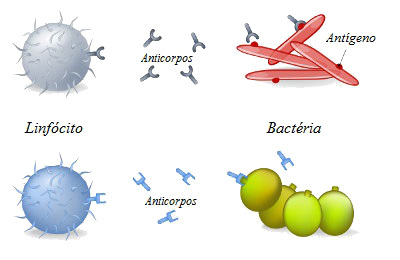Antibodies they are glycoproteins, also called immunoglobulins, whose main function is to guarantee the body's defense. These defense glycoproteins act in different ways to prevent an invading particle from causing harm to health. They can be found in plasma, in cytoplasmic compartments, on the surface of some cells, in interstitial fluid and even in the breast milk.
Antibodies are produced by plasma cells, that form after the differentiation of a leukocyte called lymphocyte B. Antibody production occurs after lymphocyte stimulation by a given antigen, like a virus or a bacteria.
After its production, the antibodies begin to interact with the antigens to guarantee the organism's defense. It is noteworthy that normally there is a greater interaction between the antibody and the antigen that caused its production, however, there may be interaction with other antigens (cross reactions).
→ Antibody structure
Antibodies are formed by two light chains identical and two heavy chains also identical. These chains have a variable amino-terminal region and a constant region. A light chain is linked to the heavy by disulfide bonds.
In heavy chains, there are constant terminal carboxyl moieties called the Fc fragment, which are responsible for the biological actions of the antibody. The segments present at the amino end belonging to the light and heavy chains are called the Fab fragment, the region where the antigen binds. The amino acid sequence of the Fab sequence is variable.

Look at the light chain and heavy chain of an antibody.
→ What are isotypes?
We call the different classes of antibody molecules isotypes. These classes are called IgA, IgD, IgE, IgG and IgM, with IgG being the most common in plasma. Among the functions of IgG, we can mention the activation of phagocytosis, the neutralization of antigens and protection of newborns, since it is the only antibody capable of crossing the placenta and coming into contact with the blood of the fetus.
→ How does the antibody interact with the antigen?

Usually the antibody interacts only with the antigen that stimulated its production.
Antibodies can interact with antigen in a variety of ways. The main ones are:
Opsonization: The antibody binds to the antigen and forms an antigen-antibody complex, which helps to induce phagocytosis;
Neutralization: Process that makes invading molecules harmless;
Add-on activation: Activation of proteins that cause the rupture of the membrane of invading organisms occurs.
→ What is the mechanism of serum and vaccine?
The vaccine is an immunization agent that protects our body. It promotes active immunization as it contains antigens that stimulate the body's production of antibodies. The serum, in turn, is a passive immunization, as it already has antibodies. Therefore, our bodies do not need to produce them. Unlike the vaccine, which seeks prevention, the serum is used in the treatment.
By Ma. Vanessa dos Santos
Source: Brazil School - https://brasilescola.uol.com.br/o-que-e/biologia/o-que-e-anticorpo.htm

